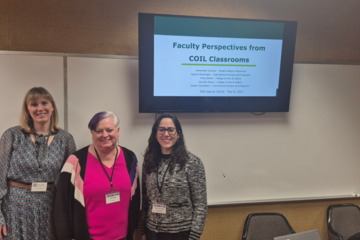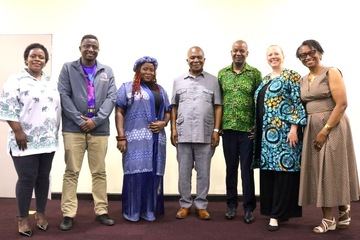Feed
-
Co-Creating Feasible and Sustainable Play-based Learning: A 2024 PIRA Award Winning InitiativeEvery year, the Alliance for African Partnership (AAP) runs an initiative known as the Partnerships for Innovative Research in Africa (PIRA). It is an opportunity for researchers to earn the funding needed to carry out collaborative, supportive and multidirectional projects which are aimed towards improving Africa. The research ideas put forward by each PIRA awardee have shown the potential to change the future of Africa for the better. The project created by Dr. Bethany Wilinski of Michigan State University (MSU) and Dr. Subilaga M Kejo of the University of Dar es Salaam (UDSM) is no exception. Collaborating, they are researching “Co-Creating Feasible and Sustainable Play-based Learning Approaches in Tanzania”. Based on a decade of collaboration in research into teaching in Tanzania, they have understood that play based teaching is essential for development of the global youth. It allows children to exercise skills across all academic areas, while developing them within authentic contexts, which in turn develops an enthusiasm for young students to continue learning more advanced subjects. Play based learning has been acknowledged on a global scale, especially so once the United Nations Convention on the Rights of the Child recognized that this approach to learning will support countries’ progress toward achieving Sustainable Development Goal (SDG) 4: quality education for all. Be that as it may, while on paper it has proven to be the superior teaching model, some countries have been unable to put this into practice, such as Tanzania. Cultural differences, time and staff restraints, and even ignorance to it’s benefits, have stopped this learning style from being used in Tanzanian classrooms. That is why the aim of Dr. Bethany Wisinki and Dr. Subilaga M Kejo’s project is to “transform pre-primary teaching and learning in Tanzania by supporting teachers’ ability to use play-based approaches effectively.” Their project consists of a three-phase plan: 1: Building a community of practice (CoP) using pre-primary teachers of UDSM’s demonstration schools, university faculty, teacher development experts and more to create a shared understanding of play based learning. 2: Together they will experiment, test and develop a professional development (PD) program about play-based for Tanzanian pre-primary teachers. 3: Pilot the PD with pre-primary teachers in Dar es Salaam and Musoma As of this article, the team have made promising headway into phase one of their project. 7 modules have been developed, and the teachers of the CoP have already completed 6. The feedback has been positive, with the teachers stating that “they find the training to be beneficial especially because of the modality where they have opportunity to read, practice, reflect and discuss about their experiences which has enhanced their understanding…Generally, the teachers see the benefits of play and seem more motivated and confident to use play-based learning approach.” There are already plans in place to move phase two of the project on schedule, and both Dr. Bethany Wisinki and Dr. Subilaga M Kejo feels that their work will leave a positive impact on Tanzania’s teaching methods and youth moving forward. Upon the project’s completion, they plan to use their findings “to inform the development of a research-practice partnership with the Tanzania Institute of Education focused on improving the quality of preservice preparation for pre-primary teachers.”By: Baboki Gaolaolwe-MajorTuesday, Jul 15, 2025YOUTH EMPOWERMENT+1

-
The Business of Water: A COIL Project By AAPCollaborative Online International Learning (COIL) is a method of education which fosters intercultural learning and development through shared values, presented perspectives, and mutual understanding despite geographical and cultural barriers. It connects students and professors in different countries for collaborative projects and discussions carried out virtually as part of their coursework. As an educational innovation, it reflects the values and goals of the Alliance for African Partnership (AAP) to foster mutually beneficial programs which catalyze lasting partnerships among our consortium members, which is why AAP launched the COIL Faculty Fellows Program-Africa in 2023. Since 2023, AAP along with Michigan State University’s (MSU) Global Youth Advancement Network have supported 14 teams of faculty to design and implement COIL projects. The highly successful“The Business of Water” COIL project implemented by faculty from MSU and the University of Nigeria Nsukka is a great example of the type of impact COIL can have on both faculty members and students The project comprised 30 students from UNN and MSU, and led by Antoinette Tessmer OF THE Broad College of Business (Finance Dept.), Michigan State University and Nkadi Onyegegbu, Faculty of Education (Science Education Dept.), University of Nigeria Nsukka (Nigeria). It’s aim was to teach students the factors and events that control “The Business of Water” both in their universities and in their communities. UNN and MSU students communicated through online methods such as Zoom or WhatsApp, and they collected data through site visits and interviews among other methods. Over the course of six weeks, the students learned the intricacies of specific water-based businesses, such as the drinking water industry and the water recycling industry, using the Environmental Social Governance (ESD) framework to structure their research and to later propose a call to action based upon their findings. By the end of the COIL project, the students and facilitators had engaged and collaborated to such a degree that contacts, bonds and partnerships were formed, breaking through the cultural and international barriers. When giving their experiences on the project, some students wrote the following: “At the end of the day, we pushed others in new ways of understanding and collaboration that will impact us after we graduate” “This was my first experience collaborating with international students overseas and I can gladly say that COIL was the online tool that made it possible” “This experience has highlighted mutual respect and honesty, allowing us to work together on relevant and environmentally sustainable solutions...I feel more equipped to contribute to global discussions” “These problems also taught me how to communicate with people from different cultures and helped grow my interpersonal skills” By the metric of engaging students in the “Business of Water” as well as forming intercultural bonds, the AAP has deemed this COIL project another success, among many, and is excited to champion more COIL projects to come.By: Baboki Gaolaolwe-MajorWednesday, Jul 23, 2025YOUTH EMPOWERMENT+1

-
Celebrating a Legacy of Vision, Dedication, and Continental ImpactWe take this opportunity to honour one of our most visionary leaders, Professor Richard Mkandawire, who retires after years of exceptional service as the Director of the AAP Africa Office, as the Alliance for African Partnership (AAP) continues to grow in strength and purpose. The experience Professor Mkandawire has had with AAP has been nothing short of revolutionary. Richard was a well-known development expert and supporter of soil health who approached his work with insight, moral character, and endless enthusiasm. AAP has become a reliable forum for cooperative research, policy engagement, and capacity building as a result of his dedication to cultivating partnerships throughout Africa. He oversaw the expansion of the AAP throughout African institutions, fostering connections between policy, academia, and the public. From empowering young researchers to advocating for agricultural reform and ensuring soil health remained a top priority for food security on the continent, Richard's enthusiasm for Africa's prosperity was evident in every project he supported. Partners, mentees, and colleagues from around the world gathered at his farewell dinner, held on the last night of the AAP Consortium Meeting 2025 in Lilongwe, Malawi, to honor a man whose work has left a legacy. He was described as a leader, a mentor, and most importantly, a true servant of Africa, in the flood of tributes that poured in. Richard Mkandawire, AAP honors you. Your legacy will continue to inspire, your vision will keep guiding us, and your influence on the lives you have impacted and the organizations you have influenced will only grow. Richard, thank you. We wish you a peaceful, happy, and well-earned retirement.By: Baboki Gaolaolwe-MajorThursday, Jul 10, 2025AGRI-FOOD SYSTEMS+2

-
Higher Education, Geopolitics, and Sustainable Development in AfricaAmid shifting geopolitical and policy landscapes in the U.S., uncertainties have emerged that may impact global education and research collaborations. While the full implications of these changes remain unclear, higher education institutions must remain steadfast in their mission to promote knowledge, collaboration, and sustainable development. Alliance for African Partnership (AAP) in collaboration with the African Studies Center, Michigan State University are pleased to invite you to the AAP Public Dialogue on Higher Education, Geopolitics, and Sustainable Development in Africa. Join us as our expert panel discuss the contributions of African higher education institutions in transformative research, policy shaping, crisis leadership, and actionable strategies for strengthening the higher education sector amid these uncertainties, while advancing the 2030 Agenda for Sustainable Development. Panelists: Tawana Kupe – Visiting Research Scholar, Michigan State University Amalia Uamusse – Deputy Vice Chancellor, Eduardo Mondlane University David Norris – Vice Chancellor, University of Botswana Mwenda Ntarangwi – Vice Chancellor, USIU-AfricaBy: Justin RabineauWednesday, Mar 12, 2025EDUCATION
-
Breaking Barriers: Sexual and Gender Minority-Led Advocacy to End AIDS in Africa and The CaribbeanBreaking Barriers provides readers a rare window into the realities of LGBT activism in Africa and the Caribbean. Close examinations of the ways in which LGBT-led activist organizations in Africa and the Caribbean contribute to progress in addressing the HIV epidemic in the face of immense and varied challenges are too rare. This book changes that dynamic by following these activists' journey to success under difficult circumstances. Readers will learn what it takes for local activists to eliminate obstacles to HIV prevention and care in their communities.By: Robin Lin MillerMonday, Feb 17, 2025HEALTH AND NUTRITION

-
AAP announces 8 new PIRA partnership awardsAlliance for African Partnership (AAP), a consortium of ten leading African universities, Michigan State University (MSU), and a network of African research institutes, is excited to announce the recipients of the 2024 Partnerships for Innovative Research in Africa (PIRA) seed funding. Each team is composed of at least one lead from an AAP African member institution and one MSU lead. Some teams also include additional partners from NGOs and/or other universities from outside of AAP’s consortium. A consortium-wide initiative, PIRA grants are a tiered funding opportunity designed to cultivate and support multidirectional and transregional research partnerships at any stage of their development, whether it be initiatives to explore and create new relationships or scale existing ones. The total amount of PIRA grants awarded in 2024 is over $500,000. Awarded projects cover diverse disciplinary perspectives and span AAP’s seven priority areas: Agri-food systems Water, Energy and Environment Culture and Society Youth Empowerment Education Health and Nutrition Science, Technology and Innovation All projects will integrate gender, equityand and inclusion issues in all stages of the project. This year’s winning projects include: Towards the Implementation of Smart Villages in the Rural Communities of Taraba State in Nigeria Research leads: Shanelle N. Foster (MSU), Chidimma Frances Igboeli (University of Nigeria, Nsukka), Mbika Mutega (University of Johannesburg), Sari Stark (University of Lapland) Institutional partners: Michigan State University (College of Engineering), University of Nigeria, Nsukka, University of Johannesburg and University of Lapland Funding tier: Scaling grant (up to $100,000) Green Technology Extraction and Characterization of Bioactive Components from Edible Fruits of Vitex donania and Uvaria chamae Research leads: Leslie D. Bourquin (MSU), Insa Seck (UCAD) Institutional partners: Michigan State University (College of Agriculture & Natural Resources), Universite Cheikh Anta Diop Funding tier: Planning grant (up to $50,000) Qi Hua Fan of MSU (left) and Tabitha Amollo of Egerton University (right) working in their solar cell lab. Develop a Partnership for Renewable Energy Research and Education Research leads: Qi Hua Fan (MSU), Tabitha Amollo (Egerton) Institutional partners: Michigan State University (College of Engineering), Egerton University Funding tier: Scaling grant (up to $100,000) Bridging the Gap: Strengthening Research, Management and Community Alliances in South Africa’s Largest Coastal Marine Protected Area Research leads: Amber K. Peters (MSU), Els Vermeulen (UP), Grant Smith (Sharklife) Institutional partners: Michigan State University (College of Agriculture and Natural Resources), University of Pretoria, Sharklife Conservation Group Funding tier: Planning grant (up to $50,000) Changing Public Attitudes and Behaviors of Buying Counterfeits through Evidence-Based Education and Awareness-Raising Campaigns in Kenya Research leads: Saleem Alhabash (MSU), Maureen Kangu (USIU), Robi Koki Ochieng (USIU), John Akoten (Anti-Counterfeit Authority) Institutional partners: Michigan State University (College of Communication Arts & Sciences), United States International University-Africa, Anti-Counterfeit Authority Funding tier: Planning grant (up to $50,000) Leveraging Tourism and Hospitality Ecosystems to Expand Youth Entrepreneurship and Empowerment in Botswana Research leads: Karthik Namasivayam (MSU), Mokgogi Lenao (UB) Institutional partners: Michigan State University (Broad College of Business), University of Botswana Funding tier: Planning grant (up to $50,000) Children attending Pre-school in Tanzania benefit from the research project of Bethany Wilinski of MSU and Subilaga M Kejo of University of Dar es Salaam. Tucheze Pamoja: Co-Creating Feasible and Sustainable Play-based Learning Approaches in Tanzania Research leads: Bethany Wilinski (MSU), Subilaga M Kejo (UDSM) Institutional partners: Michigan State University (College of Education), University of Dar es Salaam Funding tier: Scaling grant (up to $100,000) Promoting Science Communication and Engagement through Training and Digital Media Platforms Research leads: Susan McFarlane-Alvarez (MSU), Dikabo Mogopodi (UB) Institutional partners: Michigan State University (College of Communication Arts and Sciences), University of Botswana Funding tier: Planning grant (up to $50,000) “We were extremely impressed with the quality and diversity of proposals we received for this cycle of the PIRA program. The projects that were awarded all embody AAP’s commitment to innovation, equitable partnership, and our shared vision of transforming lives in Africa and beyond,” said Amy Jamison, co-director of the Alliance for African Partnership. A unique aspect of PIRA grants is the expectation that institutions will establish and develop equitable partnerships from conception to close out of their respective projects. These equitable partnerships will be among the research team members themselves and include relevant local stakeholders. Teams will involve these local stakeholders as appropriate throughout the project, respecting their knowledge and expertise, and taking an adaptive approach that is responsive to the local context. We invite you to join our virtual PIRA launch and showcase event at 8 a.m., Tuesday, Feb. 25 when all of our awardees will be discussing their projects. You can register for the event on Zoom.For more information, visit the Alliance for African Partnership website.By: Justin RabineauMonday, Jan 27, 2025AGRI-FOOD SYSTEMS+6

-
Multidimensional impact of environmental change in the African Great LakesRecorded on March 24th, 2023 as part of AAP Public Dialogue SeriesBy: Justin RabineauMonday, Jan 27, 2025WATER, ENERGY, AND THE ENVIRONMENT

Leave a comment